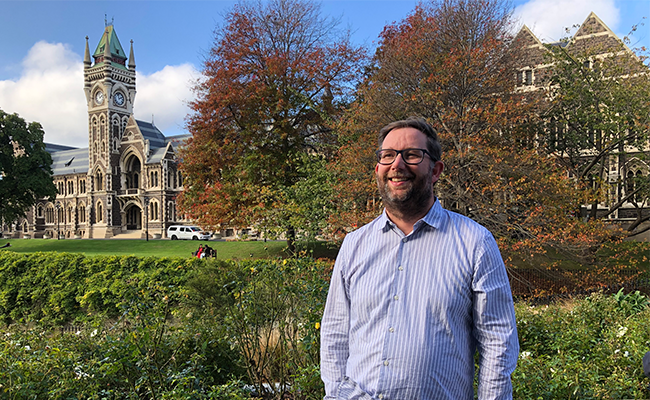Wednesday 10 May 2023 12:56pm

PhD candidate Nick Bowden found autistic students were less likely to be stood down from school if they were given good support.
Autistic students are three times more likely to be stood down or suspended from school than non-autistic students, but that rate decreases significantly when they have good support such as a teacher’s aide, an Otago University researcher has found.
PhD candidate Nick Bowden, who is due to graduate this week, analysed population-level data collected from government agencies for his research into autism and the challenges faced in health, education and their involvement with the justice system.
He hopes his findings will provide the quantitative evidence lobbyists require for policy change around autism and the help autistic people and their whānau can receive.
Bowden describes this discovery around the impact of appropriately supporting autistic students as the best use of the data so far.
“It’s a huge result because we know that being suspended or stood down form school can often lead to other challenges in education such as school refusal, low attendance, changing of schools and ultimately lower academic achievement. Then there’s the subsequent downstream effects such as poor labour market and things like that.
“The research showed inequalities faced by the group but it also signalled a pathway forward to reduce those by supporting these students and their family appropriately.”
During his research, Bowden was able to tap into an “amazing information source” which hasn’t been previously used for autism research. It contains data collated by government agencies on all New Zealanders which has been made available for use by researchers doing work that benefits the public.
“The goal of the PhD was to explore using those data and hopefully to try and put some quantitative evidence behind existing qualitative research and anecdotal evidence.”
Bowden says autism is quite common among children and young people. Statistics compiled in the United States suggest up to 1 in 36 children have an autism diagnosis, a rate that has increased dramatically over the last 20 years, primarily due to growing awareness and improved diagnostic processes, he says.
A lot of qualitative research on autism has been done in Aotearoa New Zealand but there has not been much quantitative research.
Using population data, Bowden was able to explore the health, educational, and criminal justice system experiences of autistic young people.
Working with the autism and autistic communities enabled him to hear stories from autistic individuals, parents and teachers, who said autistic children have a lot of trouble in mainstream education, staying in school, attending school and getting suspended.
Supporting the student better led to better outcomes.
There is a funding pool offered to roughly 1% of the population called the Ongoing Resourcing Scheme (ORS). Autistic students are often eligible for this funding, and it’s the highest level of support available in schools. Once accessed, it will stay with the student for the duration of their school career.
Autistic students who accessed this support went from being three times as likely to be stood down as regular students, to being equally as likely to be stood down.
Bowden then looked at the interactions with the criminal justice system of a three year birth cohort (everyone born in New Zealand from mid-1992 until mid-1995), and where they were proceeded against by police, charged in court, convicted and incarcerated.
There is conflicting international evidence around whether autistic people are more likely to interact with the criminal just system than non-autistic people.
“It turns out, we found that, in New Zealand at least, they were less likely to be proceeded against by police, and to be charge and convicted in court.”
He believes that this finding helps to debunk existing myths that autistic people and more likely to engage in criminal behaviour, but also in part, this is an indication that autistic young people are being appropriately diverted out of the justice system, which is not a good place for autistic people to be, for less serious crimes.
However, there appeared to be a threshold whereby once the crime is serious enough and punishable by two years in prison, the level of understanding “went out the window” and appropriate accommodations were not being provided.
“We don’t know for sure why this is happening, and so probably this piece of work asked more questions than it answered.”
Autism comes with a lot of challenges and has a huge impact on not only the person but also their family. It is a condition associated with sensory issues, challenges around communication, repetitive patterns of behaviour and interests, as well as ADHD, intellectual disability and other physical health conditions, Bowden says.
There are positive things associated with the autism as well.
“It’s also something that comes with incredible strengths, things like logical thinking, great memory, visual thinking and wonderfully different perspectives on the world.”
Bowden feels one of the strengths of his research was working closely with autistic people and the autism community – the community is one that has some sort of relationship with an autistic person be it family or an organisation – and building relationships. He worked closely with an autistic adult, who was co-author on two of his papers.
He is grateful to receive an Exceptional Thesis acknowledgement but would like for the collective efforts of everyone he worked with, and the importance of the work, to also be recognised.
“I’m so proud of what I did, but I’m pleased for everybody involved as well.”
Bowden handed his thesis in last July and has since received funding to continue work on autism. He hopes this work will result in a nationwide screening for autism in children to facilitate earlier diagnosis and better, more timely supports. The earlier someone is diagnosed, the sooner they can get support.
He will graduate with a PhD from the Department of Women’s and Children’s Health on May 13.
-Kōrero by internal communications adviser, Koren Allpress
